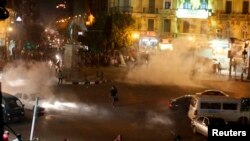Egypt's prosecutor general has ordered the arrest of two prominent activists, saying they incited protests against a new law banning demonstrations without prior approval.
Wednesday's order involves Ahmed Maher and Alaa Abdel Fattah, and comes a day after authorities detained 24 other activists for taking part in the protests in Cairo.
Police used water cannons to break up two small demonstrations outside the parliament building.
The Islamist Muslim brotherhood criticized the security forces, saying the forceful dispersals are reminiscent of tactics employed under deposed leader Hosni Mubarak.
A spokesman for the Brotherhood's political wing said in a statement on Wednesday that security forces were acting with a level of impunity that recalls the "tyranny and violation of freedoms and rights" seen under Mubarak's autocratic rule.
The Brotherhood called the new law "draconian" and said it is meant to silence any opposition.
Late Tuesday, hundreds of protesters defied the law and earlier police response, gathering in the same area of downtown Cairo to once again voice their complaints.
After Tuesday's arrests, 10 members of a panel appointed to draft Egypt's new constitution suspended their work in protest.
Also on Tuesday, U.N. High Commissioner for Human Rights Navi Pillay called on Egypt's interim government to amend or appeal the law, warning that it could lead to "serious breaches of the right to freedom of assembly."
Pillay said she is particularly concerned about the way the law describes the use of violence by security forces in response to protests. She says it could create a situation where violent behavior by a few protesters could draw an excessive reaction that puts the lives of peaceful demonstrators at risk.
Egyptian authorities have been cracking down on the opposition, particularly the Islamist Brotherhood, since the military ousted president Mohamed Morsi in July. Security forces have arrested much of the Brotherhood's top leadership and clashed with those demonstrating against the interim government. More than 1,000 people, mostly Islamists, have been killed in the fighting.
Morsi is being held by the authorities awaiting the January 8 resumption of his trial on charges of inciting murder and violence during clashes outside the presidential palace last December.
The Muslim Brotherhood has continually demanded that Morsi be reinstated as president.
Wednesday's order involves Ahmed Maher and Alaa Abdel Fattah, and comes a day after authorities detained 24 other activists for taking part in the protests in Cairo.
Police used water cannons to break up two small demonstrations outside the parliament building.
The Islamist Muslim brotherhood criticized the security forces, saying the forceful dispersals are reminiscent of tactics employed under deposed leader Hosni Mubarak.
A spokesman for the Brotherhood's political wing said in a statement on Wednesday that security forces were acting with a level of impunity that recalls the "tyranny and violation of freedoms and rights" seen under Mubarak's autocratic rule.
The Brotherhood called the new law "draconian" and said it is meant to silence any opposition.
Late Tuesday, hundreds of protesters defied the law and earlier police response, gathering in the same area of downtown Cairo to once again voice their complaints.
After Tuesday's arrests, 10 members of a panel appointed to draft Egypt's new constitution suspended their work in protest.
Also on Tuesday, U.N. High Commissioner for Human Rights Navi Pillay called on Egypt's interim government to amend or appeal the law, warning that it could lead to "serious breaches of the right to freedom of assembly."
Pillay said she is particularly concerned about the way the law describes the use of violence by security forces in response to protests. She says it could create a situation where violent behavior by a few protesters could draw an excessive reaction that puts the lives of peaceful demonstrators at risk.
Egyptian authorities have been cracking down on the opposition, particularly the Islamist Brotherhood, since the military ousted president Mohamed Morsi in July. Security forces have arrested much of the Brotherhood's top leadership and clashed with those demonstrating against the interim government. More than 1,000 people, mostly Islamists, have been killed in the fighting.
Morsi is being held by the authorities awaiting the January 8 resumption of his trial on charges of inciting murder and violence during clashes outside the presidential palace last December.
The Muslim Brotherhood has continually demanded that Morsi be reinstated as president.





